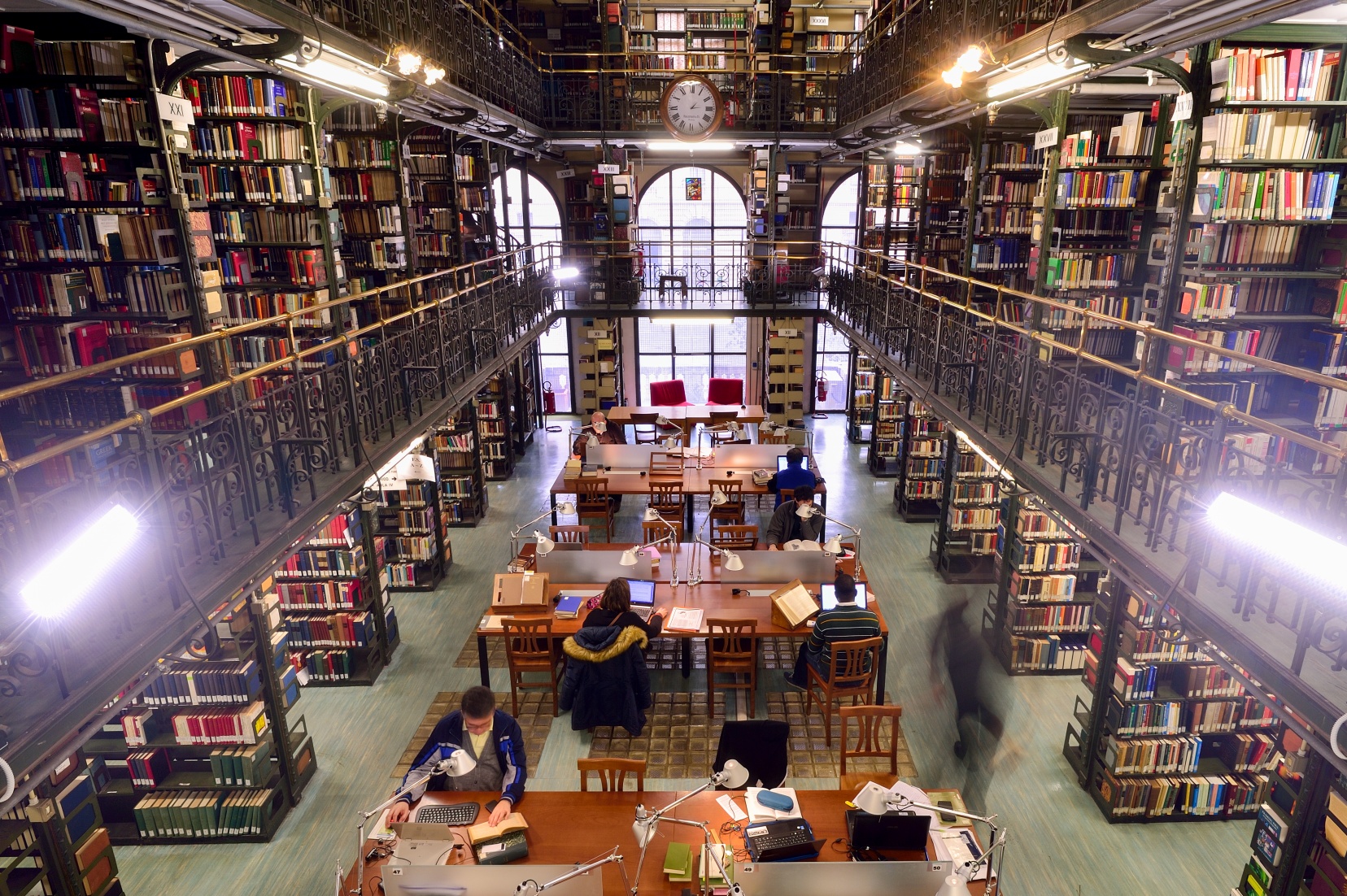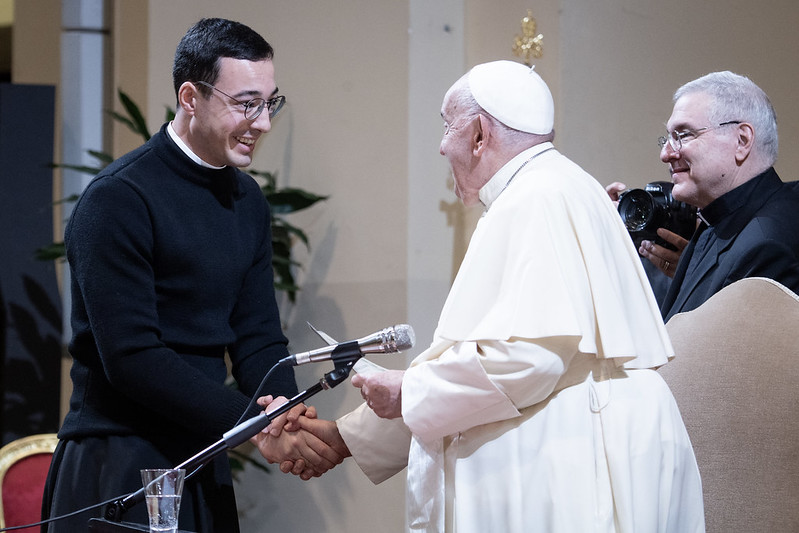- Home
- La Gregoriana
- 64 - Peace be with you all
- Rigour or affability? Method or spirituality?
Share:

Two souls coexist within the Pontifical Biblical Institute:
the first is academic rigour and the seriousness of scholarly research;
the second is an environment characterized by a spirit of affability,
spirituality and academic freedom.
Together, these two souls contribute to the integral formation of its students.
The Pontifical Biblical Institute was founded in 1909 by Pope Saint Pius X and entrusted by him to the Society of Jesus. It is a research and teaching institution specialized in the study of the Bible and related fields. But it is the voice of its students, their aspirations and concerns, their encounters, their hopes and the new horizons that unfold before them, that provides the best insight into its beating heart.
Intellectual rigour and affability
At the start of my studies towards a Licentiate in Sacred Scripture at the Pontifical Biblical Institute, I had been informed that proficiency in Biblical Greek and Hebrew would require considerable effort. Given that several years had gone by since my previous studies - a Bachelor’s degree in Anglistics and Germanistics and a Baccalaureate in Theology - I had some concerns about the level of challenge that lay ahead. However, the time and effort I invested in the program began to yield positive results from the outset. As a result, the Biblical Institute, rather than being the feared centre for intellectual torture I had initially expected, soon proved to be a stimulating and appealing environment.
My name is Sister Anna Matikova, a Daughter of St. Paul. In the past, I held various positions at our publishing house, the “Pauline editions”, in the Czech Republic. In light of my editorial and publishing experience, I was grateful for the opportunity to select classes for my Licentiate studies that prioritised written assignments. I humbly believe that the foundation of education at this level should be the cultivation of critical and creative thinking, rather than replicating previously acquired notions. My studies at the Biblical Institute have further reinforced this conviction, and I am grateful to have encountered lecturers who have the capacity to motivate students to engage in meaningful and stimulating research activity.
Following the Licentiate, I was encouraged to consider pursuing a Doctorate, which I accepted with gratitude. Indeed, the doctoral journey can occasionally entail moments of frustration and disorientation, where the sense of purpose in conducting research alone along uncharted paths can feel overwhelming. During such times, it has been extremely helpful to receive support and encouragement from my fellow Licentiate and Doctoral students, as well as from the faculty members.
The remarkable blend of intellectual rigor and genuine affability that I have encountered among many people at the Biblical Institute, is precisely what I wish to bring back with me, cherishing it not only as a sentimental memory but, above all, as a way of life to be nurtured.

Combining a scientific approach with spiritual analysis
I am Father Valentin Rhonat, I am a French citizen and I belong to the Communauté Saint-Martin, a community of priests and deacons committed to praying, living and working together in the service of the dioceses. I began my studies at the Pontifical Biblical Institute with some trepidation and preconceived ideas. I was worried about the level of commitment required, the historical-critical methodology, the technically demanding exegesis, and even the inherent risks of faith. So, I was very surprised when, in my first year, a professor said: “You know, you don’t have to be very intelligent to pursue Biblical studies”. That is exactly what he said. He went on to explain: “There are no overly complicated concepts or theories, but rather many small elements that one must master”. I must admit that I found it required hard work, daily effort, and a change of method, but if one is serious in their dedication to these studies, no extraordinary abilities are required. Today I find that my initial fears were unfounded and I find that the exegesis at the Biblical Institute is very well done.
From the beginning, I was struck by the remarkable humility of the professors. Given the wealth of unanswered questions and information that remains unknown to us, the professors encourage us to express our ideas and thought processes freely. I found the fact that there are many methods of exegesis, and that there is no ideology that imposes one preference over another to be deeply inspiring. It fosters an atmosphere of academic freedom while respecting individual roles.
Faith is also expressed in a discreet way, as many of us - from diverse backgrounds, including Jewish, Protestant and atheist beliefs - work around the Bible. This discretion has the effect of opening our minds to every intellectual world. We are fully Christian and fully Catholic, but we also strive to maintain an intellectual space that respects the individual before us, and some courses are in fact taught by Jewish professors. Although we do not currently engage in lectio divina at the Biblical Institute, as we do exegesis as scholars, it is evident that each professor individually pursues marked spiritual research on the Word on their own, to which we are invited.
At the Biblical Institute I also had some responsibilities as a student representative, an experience that enriched my understanding of the importance of sharing not only in the classroom. In fact, the professors encourage us to interact in such a way that we are able to have much more friendly conversations, including about the connection between our prayer life and exegesis. Most of us are priests and members of congregations, although there are a number of deeply religious lay people, and we are being trained not only to be scholars but also to be apostles. How will these studies help me in my ministry? I am training to be a teacher for our seminary, but there is more. I have gained a 100% academic perspective that I can enrich with a spiritual perspective. My ministry is centred on the Word of God and this will certainly guide me in my choice of pastoral proposals. This is a great enrichment for my community: one brother is an expert in dogmatics, another in patristics, and now there is an expert in exegesis.


